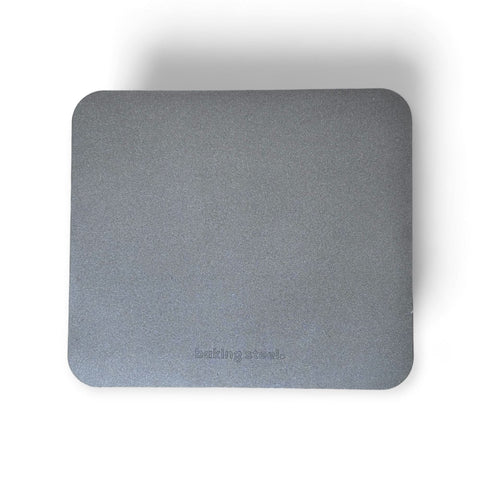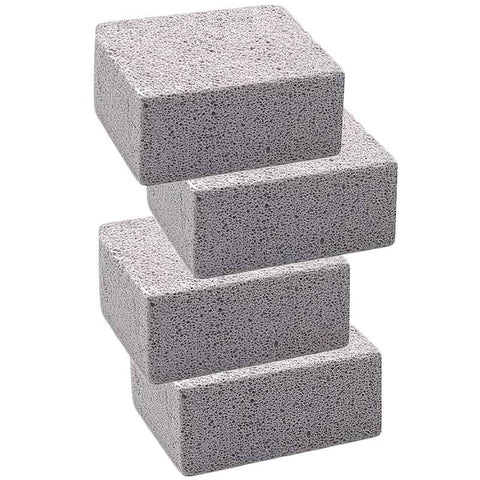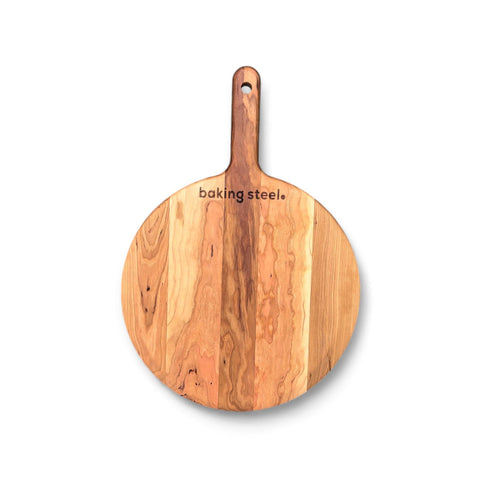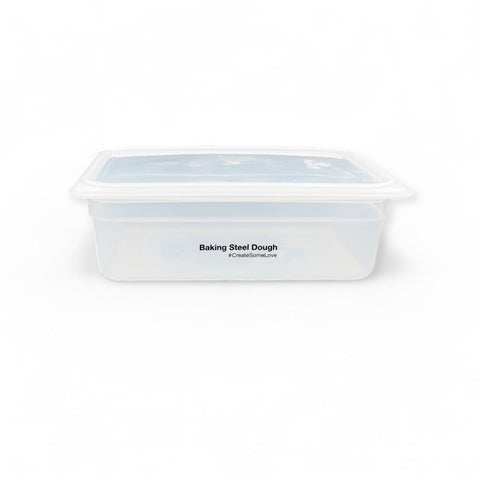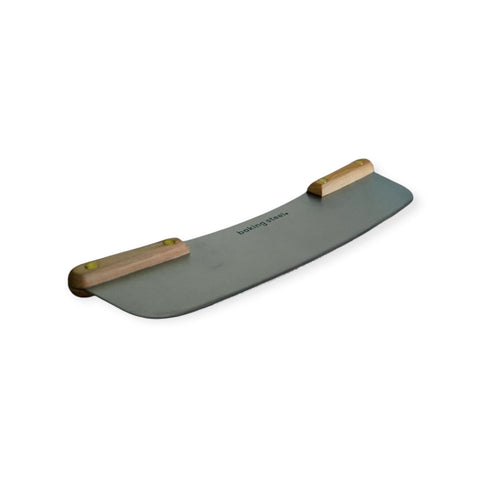the science of baking steel: why steel beats stone in a home oven
if you love thin, crispy, restaurant-level pizza at home, this is the good stuff. this is the why behind the baking steel — the science that lets a normal 500–550°F home oven behave more like a 900°F pizzeria oven.
i’m andris, founder of baking steel. i’ve been obsessed with this question for years: “how do we get that same blistered, crisp, airy crust at home… without a wood-fired oven?”
spoiler: the answer is carbon steel and specifically, a thick slab of ultra-conductive Baking Steel sitting on your oven rack.
why restaurant pizza hits different
a true neapolitan-style pizza is baked in a wood-fired oven around 800–900°F and cooks in about 60–90 seconds. your home oven? it usually tops out around 500–550°F.
that extra heat in a pizzeria oven gives you:
- a super fast bake
- leopard-spotted bottom crust
- open, airy cornicione (the rim)
- cheese melted, not obliterated
we can’t magically turn your home oven into a 900°F pizza oven… but we can use physics to cheat.
if the air in your oven can’t get hotter, the only move is: make the surface your pizza sits on transfer more heat, faster. that’s where steel blows ceramic stones out of the water.

baking steel vs pizza stone: thermal conductivity
here’s the simple version: thermal conductivity = how quickly a material moves heat from itself into something it’s touching.
typical materials:
- ceramic / cordierite stone: low thermal conductivity (heat moves slowly)
- carbon steel: very high thermal conductivity (heat moves fast)
in plain language: steel is roughly an order of magnitude more conductive than ceramic. that means it can deliver heat to your pizza dough way faster than a traditional pizza stone.
imagine two surfaces sitting in the sun on a hot day:
- walk barefoot on a ceramic paver warm, but you can stand there
- walk barefoot on a sheet of steel terrible idea, you’re jumping off in a second
same sun. same air temperature. completely different heat transfer to your foot. that’s thermal conductivity in action and that’s exactly what happens to your pizza dough.
when you drop your dough onto a preheated baking steel at 500–550°F: the bottom of the pizza gets hit with a huge wave of heat instantly.
- the crust sets fast
- starch gelatinizes properly
- you get that crisp, blistered underside
- the overall bake time drops even though your oven air temp hasn’t changed
this is why so many people go from “my pizza is pale and soggy” to “whoa… this looks like a pizzeria” the first time they use a baking steel.
thermal mass & heat retention: why thickness matters
conductivity is only half the story. the other half is thermal mass.
thermal mass is basically: how much heat a material can absorb and hold onto. the denser and heavier the slab, the more heat it can store.
a baking steel does two things at once:
- heats up and becomes a serious heat battery
- moves that stored heat into your dough very quickly
this really matters when:
- you’re baking more than one pizza
- you’re opening the oven door a lot
- your oven struggles to recover temperature
every time you open your oven door, you lose hot air. with a thin stone, the surface itself cools down fast and your second pizza can take much longer with a weaker crust.
with a thick Baking Steel, especially a 3/8" slab, you’ve got a massive heat reservoir sitting there. the air can fluctuate, but the steel stays hot and keeps delivering that energy right into your dough.
that’s why i say the 3/8" version has more “horsepower” it just stores more energy and recovers faster between pies.
steel vs stone: durability & real-world use
beyond the science, there are some simple, practical advantages too:
- stones crack, steel doesn’t. ceramic and cordierite are brittle. sooner or later they chip, crack, or shatter especially with heat shock.
- steel laughs at heat shock. go from hot to cold? steam? broiler? steel doesn’t care. it’s built for abuse.
- you’ll buy multiple stones over a lifetime. you’ll buy one baking steel.
even six-inch-thick ceramic floors in professional ovens eventually crack. if those can’t survive forever, the $30 stone in a home oven definitely won’t.
a baking steel is essentially a lifetime tool.
myth-busting: “stones absorb moisture” and other pizza legends
let’s clean up a couple of common myths:
“pizza stones make crust crispy because they absorb moisture”
sounds nice, but it’s not really what’s happening. your dough is loaded with water. in a 500–550°F oven, water is flashing to steam almost instantly.
crispy crust comes from:
- fast heat transfer
- proper starch gelatinization
- good dough fermentation
a stone isn’t “sucking water out” like a sponge it’s just a relatively slow, gentle heat source. steel is the opposite: fast, intense, efficient.
“steel burns the bottom before the top is done”
this can happen if your dough, rack position, or bake strategy isn’t dialed, but that’s not a steel problem, that’s a setup problem.
move the rack down a notch, switch to bake + broil combo at the right time, or adjust your dough thickness and you’ll get: even baking, blistered top, and a crisp but not burnt bottom.
i teach this all the time in classes. once you see it, it’s easy.

so… what does this mean in your home oven?
here’s what most people experience when they switch from a stone or sheet pan to baking steel:
- shorter bake times at the same oven temperature
- crisper bottom crust with better color
- more consistent results from pizza to pizza
- better oven spring — the rim pops up more
- less frustration, more “holy crap, i made this” moments
you’re not changing your oven. you’re upgrading the surface that actually does the work.
that’s what the baking steel is: a performance upgrade for your home oven.
and it’s not just for pizza…
once you have a slab of hot steel in your oven (or on your stovetop), you start to realize it’s not just a “pizza thing.”
- bread – baguettes, boules, focaccia with amazing oven spring
- smashburgers – restaurant-style crust, insane sear
- roasted veggies – caramelized, not soggy
- flatbreads & naan – puffy, blistered, fast
same science, different food. steel stores and moves heat better than almost anything else you can put in a home oven.
which baking steel should you choose?
quick rundown:
- 1/4" baking steel original – perfect for most home cooks making 1–2 pizzas at a time. plenty of power, faster to preheat, lighter to move.
- 3/8" baking steel pro – more “horsepower.” ideal if you’re baking multiple pizzas back-to-back, entertaining, or you just like having the extra thermal mass.
for most people, the original is all you’ll ever need. if you know you’re the “pizza party” person, the pro is a beast.
you can check them out here:
shop baking steel
closing the loop: science you can eat
the baking steel isn’t magic. it’s just good physics applied to something we all love — pizza.
by combining:
- high thermal conductivity (moves heat fast)
- high thermal mass (stores a ton of heat)
- serious durability (no cracking, no drama)
…you get a tool that can finally help your home oven punch way above its weight.
if you’re ready to turn your oven into a legit pizza machine, grab a steel and then hit one of my dough recipes:
baking steel dough + pizza recipes
this is the science. the fun part is what you do with it.

